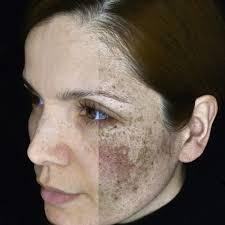
What you can do
List of Services
-
HydrationList Item 1
Keeping your skin adequately hydrated will allow it to repair damage more effectively, and also helps to prevent fine lines and wrinkles.
-
Use a professionalList Item 2
Use a professional, cosmeceutical anti-ageing skincare range containing lightening and brightening ingredients like Vitamin C, Retinol and Vitamin B3.
-
AvoidList Item 3
Avoid sun exposure and wear a high quality sunscreen daily, even if you are not in the sun directly. Don’t forget to reapply as directed.
-
Make sureList Item 4
Make sure you are getting adequate quantities of Vitamin D and Vitamin A. Both of these ingredients improve elasticity, collagen production and the overall resilience of your skin.
-
Moisturise!
Moisturise! Nourish your skin with a quality moisturiser targeted at lightening and brightening uneven skin tones.
-
Choose!
Choose products high in Vitamin C, which has been clinically proven to brighten your skin tone
What we can do
List of Services
-
Skin AnalysisList Item 2
After a thorough skin profile to determine which treatments will best target your concerns and build a treatment plan to deliver ongoing results. Unfortunately, not all types of pigmented skin can be treated. Please consult your doctor for advice.
-
Professional Depigmenting TreatmentList Item 1
Cosmelan is a topical treatment that is available through professional skin care therapist. The treatment is used to hyper-pigmentation (dark areas on the skin) and some types of skin scarring. Cosmelan may be used on the face or on the body. It exfoliates the skin to even skin tone and it inhibits the production of melanin.
Melanin is what produces color in the skin. Cosmelan comes in a kit that contains four products. The four products are a degreasing solution, Cosmelan mask, Cosmelan cream and a Vitamin K cream.
-
Mesoestetic Melanostop PeelList Item 3
Mesoestetic Melanostop Peel is a combination peel used to treat difficult epidermal pigmentation and consists of Azelaic acid, Resorcinol and Phytic acid. This combination of chemical exfoliants inhibits the formation of abnormal melanin pigmentations and breaks the cohesion of the corneal layer of keratinocytes
-
IPL Laser Pigmentation TreatmentList Item 4
IPL is an excellent and highly effective treatment for improving the appearance of pigmentation conditions. Most commonly these are known as age spots, brown spots, sun spots and sun damage. Skin pigmentation disorders cause changes to the color of your skin. Melanin is made by cells in the skin and is the pigment responsible for your skin's color.
Hyperpigmentation is a condition that causes your skin to darken, "brown or black pigment produced by cells called melanocytes". Melanin production is hereditary but increases with exposure to sunlight. Skin that has been exposed to UV light can produce irregular or abnormal pigment production in the form sun, age, or liver spots (solar lentigos) and freckles (ephelides). Skin can look patchy and uneven in tone and texture.
Pigmentation treatment uses Intense Pulsed Light which can effectively treat certain pigment problems by breaking down the pigmentation into smaller particles, which are then eliminated by the body’s own immune system.
